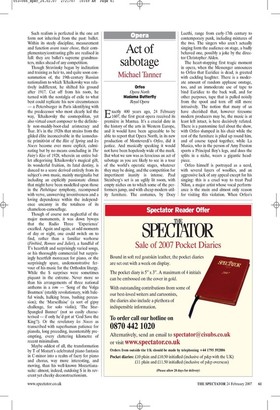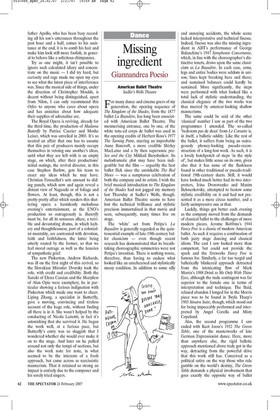Act of sabotage Michael Tanner Orfeo Opera North M
Act of sabotage Michael Tanner Orfeo Opera North Madama Butterfly Royal Opera -Elxactly 400 years ago, 24 February i 1607, the first great opera received its premiere in Mantua. It's a crucial date in the history of the arts in Western Europe, and it would have been agreeable to be able to report that Opera North, in its new production of Monteverdi's Orfeo, did it justice. And musically speaking it would not have been hopelessly wide of the mark. But what we saw was as ferocious an act of sabotage as you are likely to see in a tour of the world's operatic stages, whatever they may be doing, and the competition for impertinent inanity is intense. Paul Steinberg's set is an uglily lit room, with empty niches on to which some of the performers jump, and with cheap modern utility furniture. The costumes, by Doey Luethi, range from early-17th century to contemporary punk, including mixtures of the two. The singers who aren't actually singing form the audience on stage, a badly behaved one, possibly a joke by the director Christopher Alden.
The heart-stopping first tragic moment in opera, when the Messenger announces to Orfeo that Euridice is dead, is greeted with cackling laughter. There is a moderate amount of random applause onstage, too, and an immoderate use of tape to bind Euridice to the back wall, and for other purposes, tape that is pulled noisily from the spool and torn off still more intrusively. The notion that many of us have cherished that, however tiresome modern producers may be, the music is at least left intact, is here decisively refuted. There is a pantomime feel about the show, with Orfeo slumped in his chair while the rest of the furniture is piled up round him, and of course taped together, while La Musica, who in the person of Amy Freston sports a Principal Boy's legs, and does the splits in a niche, wears a gigantic headpiece.
Orfeo himself is portrayed as a nerd, with several layers of woollies, and an aggressive lack of any appeal except for his singing: this is a cruel way to treat Paul Nilon, a major artist whose vocal performance is the main and almost only reason for visiting this violation. When Orfeo's father Apollo, who has been busy recording all his son's utterances throughout the past hour and a half, comes to his assistance at the end, it is to comb his hair and make him look still more foolish, in general to behave like a solicitous chimpanzee.
Try as one might, it isn't possible to ignore such calculated idiocy and concentrate on the music — I did try hard, but curiosity and rage made me open my eyes to see what the latest piece of interference was. Since the musical side of things, under the direction of Christopher Moulds, is decent without being distinguished, apart from Nilon, I can only recommend this afeo to anyone who cares about opera and has anxieties about how adequate their supplies of adrenaline are.
The Royal Opera is reviving, already for the third time, the production of Madama Butterfly by Patrice Caurier and Moshe Leiser, which was unveiled in 2003. It's so neutral an affair that one has to assume that this pair of producers mainly occupy themselves in vetoing one another's ideas, until what they are left with is an empty stage, on which, after their productions' initial outings, the revival director, in this case Stephen Barlow, gets his team to enact any ideas which he may have. Christian Fenouillat's sets amount to sliding panels, which now and again reveal a distant view of Nagasaki or of foliage and flowers. At least, though, this is not a pretty-pretty affair which renders this shattering opera a harmlessly melodious evening's entertainment, as the ENO's production so outrageously is. Butterfly must be, for all its sensuous allure, a terrible and devastating drama, in which lechery and thoughtlessness, part of a colonialist mentality, are contrasted with devotion, faith and faithfulness, the latter being utterly routed by the former, so that we feel moral outrage as well as the luxuries of sympathetic grief.
The new Pinkerton, Andrew Richards, was ill on the first night of this revival, so the Slovakian Miroslav Dvorsky took the role, with credit and credibility. Both the Suzuki of Elena Cassian and the Sharpless of Alan Opie were exemplary, he in particular showing a furious indignation with Pinkerton which made one want to cheer. Liping Zhang, a specialist in Butterfly, gave a moving, convincing and tireless account of the huge role, without finding all there is in it. She wasn't helped by the conducting of Nicola Luisotti, in fact it's astonishing that she survived it. He began the work well, at a furious pace, but Butterfly's entry was so sluggish that I wondered whether she would ever make it on to the stage. And later on he pulled around not only the tempi of sections, but also the work note for note, in what seemed to be the interests of a fresh approach, but came across as narcissistic mannerism. That it retained so strong an impact is entirely due to the composer and his sorely tried singers.























































 Previous page
Previous page